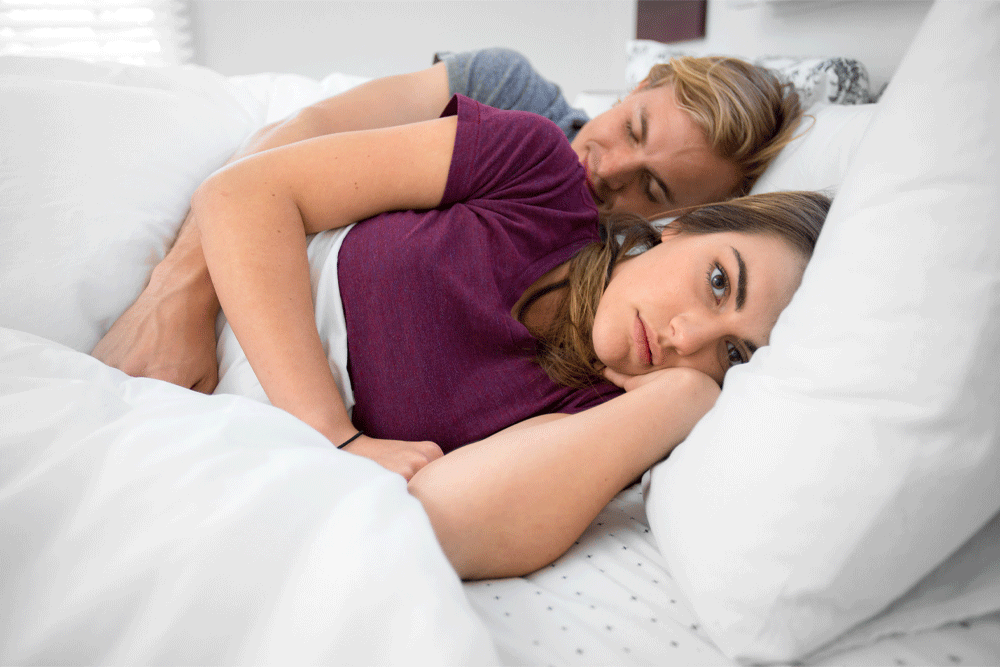Last Updated on 29th June 2023 by Charlie Walsh
Low libido – or a reduced lack of desire for sex – isn’t something that many men like to talk about, or even think about.
Sexual desire, a healthy sexual relationship with your partner and a high sex drive are often associated with how a man feels about himself.
When you’re just not interested in sex or have difficulty getting or maintaining an erection, it can be a blow to the ego.
As you age, your sex drive naturally decreases, as your levels of testosterone dip.
But there are other reasons for a low sex drive, including genetic factors or lifestyle factors. Other times, low desire can be a symptom of a more serious health condition, physical or mental.
Regardless of the cause, finding a solution can make you feel better and re-engage with one of life’s most pleasurable activities: sex.
Low Libido: 8 Common Causes
1. Low-T
Low testosterone levels are one of the main causes of erectile dysfunction and a low sex drive.
Men produce testosterone the most often during puberty and in their early 20s, and after age 30, the testosterone production slowly decreases.
However, just because your testosterone levels drop doesn’t mean that you can’t still enjoy a strong sex drive and healthy sex life.
Better sleep, regular exercise and eating well can improve your overall health and naturally boost your testosterone levels.
Or, there are also testosterone clinics that can help you supplement your natural hormone production.
2. Stress and Poor Mental Health
Both physical and mental health issues can lead to low libido for men.
If you’re having work stress, life stress or worries about your family, then you can quickly see it affect your desire for sex and intimacy.
Anxiety and depression can affect the hormone production in your body, including your testosterone production.
Plus, many people with clinical depression also experience a loss of interest in things they once enjoyed, and this can include sex.
Low self-esteem or a poor body image can also affect your mental health, and thus your libido.
Depression and anxiety medications (SSRIs) can also have side effects of erectile dysfunction and weaker orgasms. If you are taking one of these prescriptions, talk to your doctor about the side effects.
3. Unhealthy Habits
Smoking, either cigarettes or marijuana, drinking and taking drugs can all have a significant effect on your sex drive.
There’s a reason that there’s a cliché regarding whiskey and the penis.
But these vices aren’t the only thing that can affect your libido and performance.
Unhealthy eating habits and lack of exercise can also affect your testosterone production and sex drive.
We’re not saying that you have to become a gym rat or eat super clean to get your performance back to normal, but moderation is key, both with junk food and other unhealthy habits.
Plus, better physical health can also lead to more stamina in the bedroom and even greater strength for some more athletic positions.
4. Fading Interest in Your Partner
This is a tricky one – if you’re in a committed long-term relationship, it’s not unusual for the sex to feel stale – the honeymoon period gets a reputation for a good reason.
Or, maybe the emotional and sexual bonds between you and your partner that were so strong in the beginning can fade over time, and the frequency and passion can diminish.
If you sense this is happening with your relationship, you can be proactive.
Depending on the preferences of you and your partner, you can try different things in the bedroom to create excitement and spontaneity or speak with a sex counsellor or marriage therapist.
5. Underlying Medical Conditions
We talked earlier about how stress and mental health conditions can affect your libido, but there are underlying medical concerns that can directly or indirectly affect your sex drive, too.
Some of these include:
- High blood pressure
- Diabetes
- Increased cholesterol levels
- Obesity
- Chronic pain or arthritis
- Organ failure
- Cancer
6. Libido-lowering Prescription Medications
As we mentioned before, SSRIs can have libido-lowering side effects, but other kinds of medications can also lead to ED.
Just about any kind of prescription medication can affect your sexual health, including:
- Opioids and prescription painkillers
- Corticosteroids
- ACE inhibitors and beta-blockers for high blood pressure
- Cimetidine and other meds for acid reflux
- Chemotherapy and other cancer treatments
- Anabolic steroids
- Ketoconazole and other antifungal medications
Even if you notice a dip in your drive with new medications, don’t stop taking them cold turkey – it could dramatically affect your health.
Instead, talk to your doctor about your concerns and ask about alternative treatments for your health issues.
7. Becoming a Dad
Even if you’re not the one that’s actually having a baby, having children can also affect your libido.
It’s not just the lack of sleep from a new baby in the house – in fact, biologically, men experience a drop in testosterone production after their partner gives birth. Her changing hormones postpartum can affect yours, as well.
However, your hormone levels will gradually resume their pre-baby state, although having small children can be a libido-killer, simply from being tired from their care, or finding time for you and your partner to safely make love without interruption.
8. Getting Older
Unfortunately, decreased sex drive is simply something that happens as you get older.
Your body will naturally produce less testosterone.
Plus, the general physical decline can make it harder to achieve and maintain erections and even participate in sexual activity.
If your doctor feels your heart is healthy enough, you can ask for a prescription for erectile dysfunction or testosterone therapy.
Low Libido? You’re Not Alone
Low libido can easily make you feel isolated, but you aren’t alone.
In fact, studies indicate that erectile dysfunction and low desire can affect a large number of men over 50 and as much as 26% of men under 40. And low libido and lack of sex can increase stress and reduce the production of endorphins – the “happy hormone” that regulates your mood.
If you’re suffering from low sex drive, talk to your doctor – there’s no reason to go through life with low libido.










